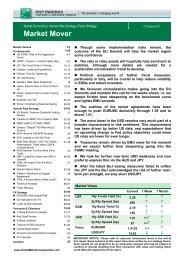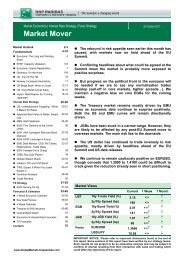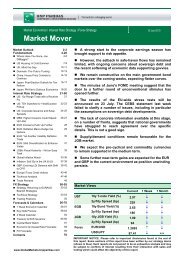MARKET MOVER - BNP PARIBAS - Investment Services India
MARKET MOVER - BNP PARIBAS - Investment Services India
MARKET MOVER - BNP PARIBAS - Investment Services India
You also want an ePaper? Increase the reach of your titles
YUMPU automatically turns print PDFs into web optimized ePapers that Google loves.
inflation rate is calculated excluding taxes on<br />
consumption, the rise should have no impact on this<br />
measure of inflation (unless providers raise their<br />
prices beyond the VAT tax hike).<br />
Most other measures taken to reduce tax loopholes<br />
will affect household income tax, taxes on savings or<br />
social contributions – none of which are included in<br />
the CPI.<br />
Reducing the health care deficit…<br />
None of the measures included in the pension reform<br />
has a direct impact on inflation. The other major<br />
cause of the deficit is health care, since the share of<br />
health care in total household consumption is on the<br />
rise in France (as elsewhere). Health care costs<br />
amounted to EUR 2,724 per person last year, the<br />
bulk of which was financed by social security (75.5%,<br />
Chart 3). Public financing of health care amounts to<br />
6.5% of GDP.<br />
In order to reduce the social security deficit, further<br />
tightening of rules on health care reimbursement will<br />
be implemented next year, according to reports in the<br />
media. The changes should generate EUR 2.5bn in<br />
2011, which compares to a projected social security<br />
deficit of EUR 12bn for 2010. The economic<br />
slowdown has reduced the pace of increase in health<br />
care expenditure (as some people have cut back on<br />
poorly reimbursed, non-urgent spending such as<br />
dentistry or glasses).<br />
The prices of some goods (medicines) and services<br />
(especially biological tests and radiological<br />
examination) will be cut but the reductions will be<br />
partially offset by an increase in the standard price of<br />
a doctor's examination (from EUR 22 to EUR 23 on<br />
1 January 2011). Overall, the measures will push CPI<br />
inflation down by about 0.06pp. These measures will<br />
be implemented progressively over the course of<br />
2011, as has been the case this year.<br />
The share of standard health services reimbursed by<br />
social security (i.e. excluding hospital or care for<br />
chronic and severe diseases) will be reduced from<br />
70% to 69.5%. The share paid by private insurers will<br />
thus rise from 30% to 30.5%. It is likely that drugs<br />
which are currently reimbursed at 35% by social<br />
security will be reimbursed at 30% only. The HICP,<br />
unlike the CPI, does not capture the full price of<br />
health goods and services but only the proportion<br />
which is not reimbursed by social security. As a<br />
result, the HICP will not benefit as much from lower<br />
prices for health goods and services as the CPI (this<br />
is the main source of divergence between the two<br />
measures of inflation).<br />
Higher contribution rates for social security,<br />
especially for accidents and sickness that occur in<br />
13.8%<br />
Chart 3: Health Care Financing in 2009<br />
9.4%<br />
Source: Le Figaro<br />
1.3%<br />
75.5%<br />
State<br />
Soc. Sec.<br />
Priv. Ins.<br />
the workplace, will result in a EUR 0.8bn increase in<br />
receipts. This will come on top of the natural increase<br />
in social contributions paid by private companies;<br />
these should reach about EUR 3.0bn in 2011, up<br />
from about EUR 2.0bn this year on the back of<br />
increases in employment and wages.<br />
…will also increase the cost of private insurance<br />
A significant share of the social security savings will<br />
result in higher costs for private health insurers,<br />
which cover about 60% of the expenditure not<br />
reimbursed by the public system. However, this<br />
should be compensated by lower prices for some<br />
goods and services.<br />
Nevertheless, private insurance companies will have<br />
to raise their prices (partly paid by employers in large<br />
corporations). A favourable tax regime has been<br />
available for private health insurance, with most<br />
players taking advantage of it. This is one of the tax<br />
loopholes that will disappear in 2011, adding<br />
EUR 1.1bn to insurers’ fiscal burden (and to CADES<br />
income). Overall, private health insurers may have to<br />
hike their rates by 5-8% next year. This would add<br />
around 0.09pp to headline CPI (private health<br />
insurance has a 1.05% weighting in 2010 and this<br />
will rise over time), or 0.10pp to the HICP (where the<br />
weighting is 1.14%).<br />
Altogether, the new measures should result in a<br />
0.26pp contribution in headline CPI inflation in 2011,<br />
raising it from 1.13% to 1.39%. The increase should<br />
be limited to 0.16pp for ex-tobacco CPI, which would<br />
reach 1.32%. The fiscal impact on the headline HICP<br />
is more important at 0.35pp. The 1.5% harmonised<br />
inflation rate we expect would nevertheless be one<br />
tenth below that of the eurozone, which also<br />
incorporates the inflationary impact of fiscal policies<br />
in different countries and higher contribution of food<br />
prices.<br />
Hh<br />
Total:<br />
EUR 162.4bn<br />
Dominique Barbet 23 September 2010<br />
Market Mover<br />
13<br />
www.GlobalMarkets.bnpparibas.com
















